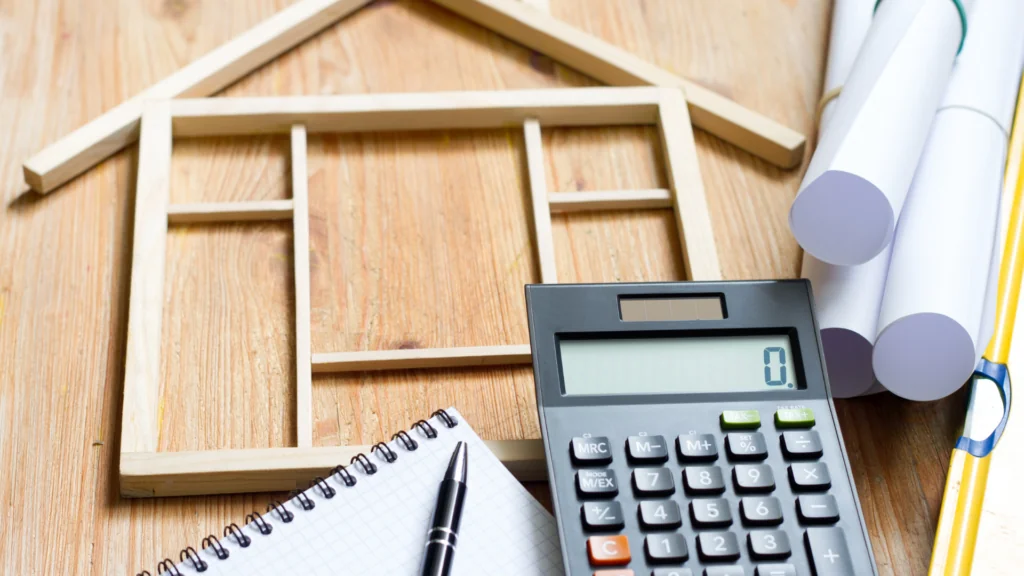Should You Use A Loan For A House Deposit?

Buying a home comes with a hefty price tag. With an average deposit hovering around 19% – roughly £53,414 for first-time buyers – and prices steadily climbing, saving enough deposit can feel like an impossible task.
No wonder many are eyeing loans to bridge the deposit gap.
And if you’re one of them, this guide is for you. We’ve explained the consequences of borrowing money for your mortgage deposit.
This article will help you understand whether taking out a loan to cover the deposit is a good option for you.
Can I Get a Loan for a House Deposit in the UK?
Yes, getting a loan for a house deposit is possible, but it comes with big drawbacks.
Most mortgage lenders do not look favourably on applications that include a borrowed deposit. This is mainly because it increases your debt-to-income ratio.
What does this mean for you? Well, it could lead to less favourable mortgage rates and higher monthly repayments.
Lenders prefer borrowers to fund their deposits through savings as it demonstrates financial stability and saving ability.
When you borrow the deposit, it suggests higher financial risk, making lenders hesitant to offer competitive rates.
Therefore, while you can find loans for house deposits, the financial implications might make it a less attractive option.
What Is Debt-To-Income Ratio?
The debt-to-income ratio (DTI) measures how much of your monthly income goes to paying debts.
You calculate it by dividing your total monthly debt payments by your gross monthly income.
For example, if your monthly income is £2,000 and you spend £720 on debts, your DTI is 36%. This is a good rate to aim for because it shows lenders you can manage your money well.
Forbes suggests keeping your DTI between 36% and 43% to get pre-approved for a mortgage more easily.
Now, let’s say you take out a loan for a house deposit.
If this loan adds another £280 to your monthly debts, your total debt payment would rise to £1,000. This makes your DTI 50%, which is higher than lenders usually like.
This could make it harder for you to get a mortgage.
Note: This example shows how loans impact what you can afford. Many other things also affect if you can get a mortgage and how much it will cost.
These include your total financial state, income stability, the loan type you want, and the property you want to buy.
Talking to a mortgage expert can help you understand how all these factors affect your ability to afford a mortgage.
Types of Loans You Can Borrow For A Mortgage Deposit
While most financial advisors don’t recommend taking out a loan for a mortgage deposit if you find yourself considering this route, here are some options you might explore:
Unsecured personal loans
You can use this loan for almost any purpose, including deposits for a house. These loans do not require collateral, but the lender will review your credit score and financial history.
However, many mortgage lenders are wary of accepting personal loan funds as a deposit as they suggest higher financial risk.
Bridging Loans
These are short-term loans used to ‘bridge’ the gap between needing funds and securing permanent financing.
While usually used in property transactions by those selling one home and buying another, some might consider them for deposits.
However, they are expensive and risky. This makes them less ideal if you need to use them for long-term mortgage planning.
Director’s Loans
If you’re running a business, you might consider taking a loan from it. This option has significant tax implications. If managed poorly, your corporation and income tax bills could get expensive.
Conversely, if you do this right, director’s loans can offer tax advantages. In essence, careful planning is key to avoiding financial pitfalls.
Overdrafts and Credit Cards
Some might consider using an overdraft facility or a credit card advance as a source for their deposit. This is not generally advisable.
Because these are high-cost forms of credit and are viewed negatively by lenders, who often perceive them as high-risk.
Family Gifted Loans
It’s common for family members to help with a deposit, either through loans or gifts.
While gifts are preferred and need to be declared with no expectation of repayment, loans from the family must be disclosed to lenders.
They can affect how lenders view your mortgage application. However, some lenders might show some leniency under difficult circumstances.
Guarantor Loans
With a guarantor loan, another person (often a family member) agrees to cover any missed payments. These are high-risk loans and come with high-interest rates.
They can potentially be used for deposits if the guarantor has sufficient financial stability and trusts the borrower implicitly.
Homeowner Loans
If you already own property, a homeowner loan allows you to borrow against the equity in your home.
This can be risky as it increases the debt against your current home.
Pro Tip
Most lenders prefer you to use your savings for a deposit. Even with just a 5% deposit, showing financial stability and creditworthiness can lead to cheaper deals than borrowing a loan for your mortgage deposit.
How Do Lenders View Loans Used for Mortgage Deposits?
Mortgage providers take a careful look at your application if your deposit comes from a loan. They check your credit rating and your financial history to decide if they should lend to you.
A high credit score can help, but a history of borrowing for significant amounts can be a red flag.
As we’ve discussed, lenders often reject applications where the deposit is loan-funded because they think it’s too risky. They prefer borrowers who have saved their deposit as it shows good money management and less financial stress.
How Much Deposit Do You Need?
When you’re buying a home, the size of your deposit greatly affects your mortgage options and the cost of borrowing.
Generally, the minimum deposit you need is 5% of the property’s price. But, a bigger deposit, like 10% or 20%, can secure better mortgage rates and terms.
This is because a larger deposit reduces the lender’s risk, making them more likely to offer you a loan with lower interest rates.
Alternatives To Borrowing Money For A Mortgage Deposit
If you’re not If you’re looking to buy a home but are wary of increasing your debt, there are several alternative funding options available for your mortgage deposit:
Family Deposit Mortgages
A common method is getting a gift from family. Mortgage lenders often let close family members help with your deposit.
This money doesn’t need to be paid back, which is great for first-time buyers. It doesn’t increase your debt but depends on having a family who can afford to help.
Guarantor Mortgages
Another option is a guarantor mortgage. With this, your family member or friend promises to pay your mortgage if you can’t.
This can help you get a mortgage that might be hard to secure otherwise. However, there is a risk for the guarantor if you fail to make payments.
Some lenders offer safer options where your family can help without risking their own money.
Shared Ownership
With shared ownership, you buy part of your home (usually 10% to 75%) and pay rent on the rest. This scheme, run by housing associations, means you need a smaller deposit and makes buying a home more reachable. But, there are rules about selling and updating your home.
Mortgage Guarantee Scheme
This scheme helps lenders offer mortgages with only a 5% deposit by providing a government guarantee.
It aims to make low-deposit mortgages available to more people and ends in June 2025.
First Homes Scheme
For first-time buyers in England, this scheme offers homes at least 30% cheaper than the market price.
It makes buying your first home more affordable by reducing both the deposit and the mortgage needed.
Saving
Perhaps the simplest but most challenging method is to save for a deposit traditionally.
By putting away money each month, you can build up the funds needed without taking on extra debt. Making a budget to cut down on extra spending can help speed this up.
Key Takeaways
- Borrowing money for a house deposit can make it harder to get good mortgage deals, like lower rates or smaller monthly payments, because lenders prefer deposits saved up by you.
- Your debt-to-income ratio (DTI) is important. If too much of your money goes to paying debts, lenders might see you as a risk and could reject your application.
- Using loans like personal loans, credit cards, or other high-interest options for your deposit can hurt your chances with lenders, so it’s better to explore alternatives.
- Instead of borrowing, you could save up on your own or look into options like family help, shared ownership, or government schemes that support buyers with smaller deposits.
- Bigger deposits, like 10% or 20% of the house price, usually lead to better mortgage deals than the minimum 5%.
The Bottom Line
Borrowing money for a mortgage deposit might help you buy a home sooner. However, there are downsides. Here’s why using a loan for your deposit isn’t the best idea:
- You might face higher interest rates and end up paying more over time.
- You’ll find it tough to find lenders willing to approve your mortgage.
- If you get approved, you’ll have two debts to manage, which can be stressful.
Overall, borrowing for a deposit makes your mortgage more expensive and harder to get. This route can complicate your home-buying process.
But, don’t worry. It’s not all doom and gloom. You can consult a good mortgage broker to help with your situation.
They can guide you through your options, especially if you’re unsure how to buy a house with no or low deposit. They can make sure you find the best path to homeownership in the UK.
Need a broker? Get in touch with us. We’ll connect you with a skilled mortgage broker who can give you personalised advice and help you start your property-buying journey.
Get Matched With Your Dream Mortgage Advisor...

Frequently asked questions
Can a mortgage deposit come from money that parents loaned?
Yes, a mortgage deposit can come from money that your parents loaned, but it’s important to disclose that the funds are from a loan.
Many lenders are cautious about deposits sourced from loans, even if the loan is in your parents’ names because it suggests financial risk. This could potentially impact your mortgage application.
It’s advisable to consult with a mortgage advisor to understand how this might affect your specific situation.




